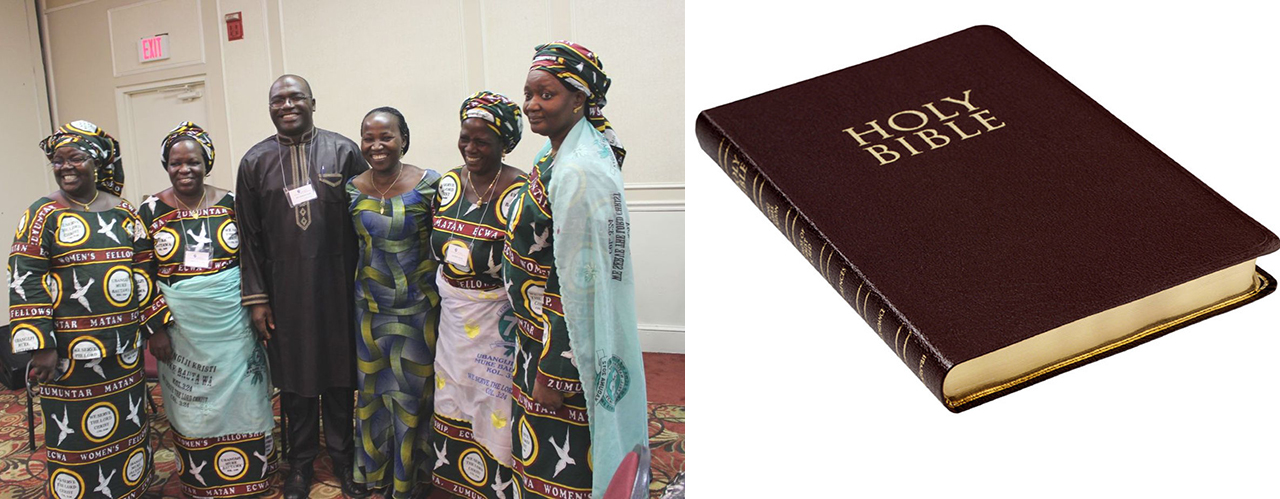-
Mission/Evangelism
-
Teaching the Word
-
Prayer
-
Worship
-
Spiritual Gifts
-
Small Groups
-
Fellowship and Community


by Rev Philologus O. Irukera | Discipline yourself to obey the voice of the Spirit through the Scriptures, Godly counsel from others and the careful prompting of your conscience by the Holy Spirit. The Lord indeed demands obedience from His true disciples (John 14:15, 23)
If you are like me, you are probably wondering like Gideon, at the height of Israel’s humiliation, subjugation and oppression by the coalition of enemies (Judges 6:11-13), why is the Church so ridiculed, weak and seemingly unable to fulfill her Biblical mandates today? Where are the aura of God’s presence and power in the Early Church that elicited fear, respect and goodwill from unbelievers (Acts 2:42-47)? Where are the famed divine exploits through both the leaders and members of the Early Church in our time (Acts 5; 6:8-10; 8; 12-13:3; Rom. 16:3)? Coming closer home in ECWA today, why do will find it difficult to replicate the faith exploits of our forefathers and the missionaries that brought to them the Gospel of Jesus the Christ? I presume the answer boils down to just one factor: the quality and depth of our relationship with God through His Spirit. This informed, sustained dynamic relationship with God through the agency of the Holy Spirit is the heart of the topic of this workshop. Being a workshop, it is expected that this meeting would be interactive. However, it would be impractical to venture into being exhaustive with just an hour long meeting. Hence, we shall depend on the Great Helper Himself to direct us to His choice of area of emphasis as we proceed. Also, some questions have been prepared separately to aid and stimulate discussion on the topic under consideration. I. Truth about the Holy Spirit The Bible is replete with information about the Holy Spirit. For example, right at the beginning in Genesis 1:2, the Bible reveals the role of the Holy Spirit in the creation story. Let us briefly consider some revealed truths about His identity and activities in the Scriptures:
II. Meaning and Reasons for Infilling of the Holy Spirit Meaning of Infilling of the Holy Spirit: Certain phrases in the New Testament give hints and shades of what constitute the infilling or the filling work of the Holy Spirit. Such include controlled by …the Spirit (Rom. 8:9), led by the Spirit (Rom. 8:15; Gal. 5:18), live by the Spirit (Rom. 8:5; Gal. 5:16), crucified with Christ …..living by faith (Gal. 2:20), Let the word of Christ dwell in you…(Col. 3:16), …walk in the light …(1John 1:7). They all point to the state of total obedience, surrender and submissiveness under the dominant will and control of the Holy Spirit. So, the filling work of the Holy Spirit can simply be explained as the sovereign act of the Holy Spirit whereby He continuously fills and exercises divine control of the life of a Christian as he consistently and progressively surrenders. Reasons for the Infilling of the Holy Spirit One may ask: why is it necessary for a Christian to be filled with the Holy Spirit? The following deserve our careful consideration:
Practical Steps toward Being Filled with the Holy Spirit Now to the question of how a Christian can be filled with the Holy Spirit. The prescription given here is not exhaustive. It is based on the insight gleaned from the Scriptures and from the accrued wisdom of other saints who have trod this path before us.
Conclusion Holy Spirit is not a mere force. He is fully God in unity with the Father and Son. Holy Spirit is very active in the world out there and in the Church elsewhere today. He is our helper who desires to make His presence and power felt in our lives for our good and to the glory of the Father. Because of our persistent rebellions, we have considerably limited the impacts of the Holy Spirit in the Church and in our lives today. The results are the waning glory and drying river of goodwill that we used to enjoy among men. We now have defeat and restriction in places we ought to have been victorious and unstoppable. We no longer impact the society for the Lord like our forefathers did. The reason is not farfetched. We have not allowed the Holy Spirit the free reign and rule that He is supposed to have in the Church and in our lives. But if we humble ourselves as a people, if I repent and turn submissively to the rule of the Holy Spirit in the Church and in my life, then there will be an end to the era of Ichabod. The renowned acts of the Holy Spirit in the days of yore of our fathers and mothers in the Way (Acts. 9:2) will again be replicated in our own very time. Sinners would be won by loads into the kingdom of God. Fear will grip and awe strike the world all over. And the work of God will be revived again in our church family and in individual lives. Only if we would be ready to say yes to the infilling work of the Holy Spirit! Only if I would jettison my big idol of carnality and you your petty idols of pride, greed, self-centeredness and the likes! If we would surrender to the lead and control of the Holy Spirit and submissively cry, Have your way now Holy Spirit of Christ Jesus! Then we will experience those blessings and benefits of infilling of the Holy Spirit which include peace, joy, practical victory over sin and over power of darkness. We would be empowered to overcome befuddling odds and limitations of life. Above all we would become bold and effective witnesses of Christ, bringing in the bounteous sheaves of ripe harvest of souls like the early Christians (Acts 4:13-20; 5:12-14; 8:4-8) and our forefathers in ECWA did. For the Church, and indeed ECWA, to regain her lost glory, power, fruitfulness, goodwill and respect from the society, we must all go back to the ancient path of total surrender and submission to the leading and control of God the Holy Spirit. For you and me to experience the authentic Biblical prosperity, we must personally allow the Holy Spirit to rule our will and affect. For Him to fill us, we must give Him the total control of our lives. May the Lord help us all as we do so. Amen! References Online Sources Begg, Alistair. (May 12, 2018). Five Truths About the Holy Spirit. June 20, 2018 www.ligoner.org/blog/five-truths-about-holy-spirit/ Bright, Bill. (n.d.) The Steps to Being Filled with the Holy Spirit. June 22, 2018 https://www.cru.org/us/train-and-grow/transferable-concepts/be-filled-with-the-holy-spirit.7.html Walvoord, JohnF. (January 8, 2008) The Filling of the Holy Spirit. July 4, 2018 https://bible.org/seriespage/11-filling-holy-spirit Books and Bible Translations Bridges, Jerry. The Pursuit of Holiness. Colorado Springs: NavPress, 2006. Cabal, Ted. (G. Ed.) The Apologetics Study Bible (HCSB). Nashville: Holman Bible Publishers, 2007. Green Sr., Jay P. (G. Ed.) The Interliner Bible: Hebrew-Greek-English. 2nd Edn. London: Hendrickson Publishers, 1986. Griffiths, Michael. Cinderella with Amnesia: A Practical Discussion of the relevance of Church. Leicester: Inter-Varsity Press, 1975. International Bible Society. The Holy Bible (NIV). Colorado Spring: Biblica, 1984. MacArthur, John F. Charismatic Chaos. Grand Rapids: Zondervan Publishing House, 1992. Willmington, Harold L. Willmington’s Guide to the Bible. Carol Stream: Tyndale House Publishers, 2011
Rev Philologus O. Irukera is a trained and ordained minister. He is an assistant minister at ECWA Church in Maryland.

I am writing in earnest and crying out for the igniting of an awakening to prayer
America is suffering from an extended spiritual drought. While the social and moral decay of this hour may grieve us, discernment of the larger reason for this blight lies at the door of an all-but-prayerless church.
We share a part of that responsibility because—had we been more conscientious earlier—we would not have allowed the progressive dismantling of weekly, united, extended corporate prayer gatherings.
I am not writing to assign guilt, for I have been too slow a learner myself. But I am writing with an invitation, one spoken from heaven and beginning to resonate in many hearts.
Although the enemy of humankind is rising viciously, knowing he has only a short time, the Holy Spirit of God is present. He is not here to condemn, but to convene the hearts of believers with His promise, wisdom and expectancy.
Above all, I feel a hope, born of prayer rising from my heart and one of love and brotherly commitment to Foursquare pastors, leaders and members. With that hope, I am writing in earnest and crying out for the igniting of an awakening to prayer.
Pray with me that we would unite to lead our congregations from our knees. Let us lead people into a lifestyle of intercession as God's Word directs (1 Tim. 2:1-2).
Unless we are biblically renewed to this first of all calling of the body of Christ, our first calling as believers will be sacrificed on the altar of sloth, and the spirit of the age will run even more rampant.
Let us affirm that there is nothing old school about the New Testament's order of the church's prayer-life. It is an ever-contemporary pattern of biblical spirituality, and nothing—not even the finest programming, productions or tactical strategies—can substitute for it.
Our Spiritual Foundation
Prayer is the foundation and fountainhead of spiritual power, breakthrough and revival; prevailing prayer, both at the local and national level, is what we and America need.
Given this situation, my hope is that The Foursquare Church may "rise to this hour" and make it a "restoring the ancient landmarks" of former victories. That, as a united-and-agreed fellowship, a vast majority of pastors and congregations would unapologetically welcome the Holy Spirit into their midst.
Pray with me that we would unite to lead our congregations from our knees. Let us lead people into a lifestyle of intercession as God's Word directs (1 Tim. 2:1-2).
Such well-ordered prayer gatherings will overthrow strongholds of darkness and release rivers of "living water" and revival blessings. Sound-minded, bold and believing prayer is prayer with a "cutting edge," namely, a lifestyle that penetrates the darkness of spiritual blindness and brings God's mercy and deliverance.
It is this kind of prayer that shatters the darkness and drives back the kind of spiritual challenge we face with the plague of evil and rebellion in our nation.
Jesus' Concern for the Last-Days Church
Someone recently asked me: "Some people think of the 1950s and 1960s as a golden age for the church in America, but were there drawbacks to the church being socially respectable?"
I answered: "I don't think of the church being 'respected' as a drawback. However, a socially comfortable church has not historically produced a spiritually passionate church."
Jesus' letters to the church in Revelation contain a similar opening, where Christ spells out His awareness and notice to each congregation and its leaders. His love for them all is never in question, but His concerns wave red-flag warnings to all of us who lead today:
You who have ears to hear, listen to what the Holy Spirit is saying!
Jesus points out that many of these churches are distracted or have neglected their central call, values and mission. The distractions are the same today; congregations are either:
The issue is clear: The Holy Spirit is seeking to find—and speak to—those with ears to hear!
Whether you are a Foursquare pastor, leader or church member, I am a bond servant with you. I invite you to join a multitude of those who are unabashedly attuned to hear, obey and respond as Holy Spirit-filled servants of Christ. This is vital for two crucial reasons:
In this critical hour, we dare not hedge on the implications of "hearing" the Holy Spirit. We dare not compromise His intentions for our fellowship as Spirit-filled and Spirit-led people.
The Key Question
The question of this hour in history resounds from the lips of the Lord: "When the Son of Man comes, will He find faith on the earth?" (Luke 18:8, NIV). Namely, the faith that answers the call to rise up in prayer!
As with any nation, the battle for America's soul will only be won with the weapons of spiritual warfare. These weapons—wielded by people systematically meeting in prayer gatherings to marshal sound-minded, biblically ordered intercession—have yet to be restored in The Foursquare Church in America.
Yet if God's people don't assemble in agreement, on their knees, who else will "destroy arguments and every lofty opinion raised against the knowledge of God, and take every thought captive to obey Christ" (2 Cor. 10:5, ESV)?
The church is the one agency on Earth with access to this promise. Heaven is waiting. God has indicated His sovereign choice: He is ready to answer with His open hand of unlimited blessing if, under His authoritative directive, we will take our stand and advance in prayer.
Today, we must remember the promise God made to Solomon long ago: "If my people … humble themselves, and pray … then I will hear from heaven and will forgive their sin and heal their land" (2 Chr. 7:14, ESV).
However, we must ask ourselves, "Where can God find a people who will align themselves with God's conditions?" This cannot be a halfway proposition. His Word of promise is only spoken into action where people welcome His Holy Spirit, and on His terms.
Aligning With the Spirit
I want to honor the wisdom, sought and applied, by which our leaders have brought administrative adjustments that we as a movement have pragmatically applied in recent years.
However, whatever else we have wisely and worthily realigned structurally, our definition of local intercessory alignment has yet to "hear what the Spirit is saying to the churches."
In this critical hour, we dare not hedge on the implications of "hearing" the Holy Spirit. We dare not compromise His intentions for our fellowship as Spirit-filled and Spirit-led people.
We are in need of reviewing Jesus' confrontation of leaders who busied themselves with religious duties but neglected God's command: "My house will be called a house of prayer for all nations" (Is. 56:7, NIV). Let us abandon all self-excusing passivity indulged when we negate our Lord's focus on the priority of prayer.
No society should ever be seen as beyond hope of revival, the recovery of sanity or the rebirth of multitudes—if it is laced with congregations everywhere where the Light of the world still shines.
The divine call of God addressing The Foursquare Church in America is no different than the one trumpeted to the larger believing body of Christ. Too many have traded the timeless for the transient, the costly for the clever, the eternal for the contemporary and the seeker-sensitivity for man-pleasing management.
Our beginning point of reference must be on our knees, in our closets and at altars of repentance. New furniture isn't required, but a ready and renewed passion is!
Jack Hayford is chancellor of The King's University and former president of The Foursquare Church.


A strong-weathered hand tightly gripped the razor sharp knife raised over the body of a young boy lying loosely bound on a crude, makeshift altar. An altar covered with dry wood that the same boy had carried to the top of this mountain.
The wood was soon to be set aflame.
This was not just any young boy—this was the son of the century-old patriarch clutching the knife. His son. It was his only son. It was the son of promise. It was the son that the father's God—Jehovah—now demanded as a sacrifice simply to test his loyalty.
Nearby was the vessel containing fire with which he would complete the slaughter and burnt offering. It would be a heartbreaking act of total and complete obedience.
The son's wide-open eyes and quivering lips were more than his father could bear. The old man closed his eyes—brimming with salty grief—and raised the instrument of death higher. Muscles tensed as he began the downward thrust into the heart of the son he loved more than anything.
"But the angel of the Lord called to him out of heaven and said, 'Abraham, Abraham!' And he said, 'Here I am.' Then He said, 'Do not lay your hands on the boy or do anything to him, because now I know that you fear God, seeing you have not withheld your only son from Me'" (Gen. 22:11-12, MEV).
Abraham turned and looked. There was a ram caught in the thicket. A substitution—an offering to be sacrificed in the place of the son he loved. The great apostle Paul tells us in Romans 4 that righteousness was counted to Abraham. What's interesting is the "why."
It was because "Abraham believed God." Not believed in God … or about God. … He simply believed God—and that what God had promised, God was able to complete.
Isaac was the child of those very promises, and Abraham believed in his heart of hearts that God was perfectly capable of raising the boy from the dead if necessary (see Heb. 11:17-19). Abraham's responsibility was to trust—to believe God.
Life has a way of making believing God very difficult to do. When things aren't going the way we think they are supposed to—when God is asking us to walk through the valley of deep darkness—it is easy to believe in God, but much more difficult to simply believe God.
During the challenges of life, when believing God seems arduous and nearly impossible, meditate on some of these promises.
When the future is bleak and unsure: "For I know the plans that I have for you, says the Lord, plans for peace and not for evil, to give you a future and a hope" (Jer. 29:11).
Believe God …
When you are exhausted from the pressures of life: "Come to Me, all you who labor and are heavily burdened, and I will give you rest. Take My yoke upon you, and learn from Me. For I am meek and lowly in heart, and you will find rest for your souls" (Matt. 11:28-29).
Believe God …
When making ends meet physically … emotionally … financially … seems difficult at best: "But my God shall supply your every need according to His riches in glory by Christ Jesus" (Phil. 4:19).
Believe God …
When God's never-ending love for you seems distant and unattainable: "For I am persuaded that neither death nor life, neither angels nor principalities nor powers, neither things present nor things to come, neither height nor depth, nor any other created thing, shall be able to separate us from the love of God, which is in Christ Jesus our Lord" (Rom. 8:38-39).
Believe God …
When fear and anxiety consume your world, and the lack of peace creates a vacuum in your heart and life: "I have told you these things so that in Me you may have peace. In the world you will have tribulation. But be of good cheer. I have overcome the world" (John 16:33).
Believe God …
As He was with Abraham … so He will be with you.
Believe … God.
Prayer Power for the Week of January 24, 2016
This week meditate on scriptures that emphasize believing God and note the outcome in the lives and circumstances of those who placed their trust in Him. Begin to declare God's promises over your life and thank Him that He is faithful to watch over His Word to perform it. Continue to pray that He send more laborers into His harvest fields. Pray that God's people would unite in prayer and purpose for worldwide revival. Remember to lift up our nation, its leaders, and our allies. Pray that Israel would fulfill God's purposes in this hour and remember our military and families as they serve the nation. (Romans 8:38-39; Phil. 4:19; John 16:33)

Faith is a spiritual force. James is talking about your faith being tested so you will know where you are. Are you able to slay the giants? (image, Che Garman)?
"Because it has been given to you to know the mysteries of the kingdom of heaven, but to them it has not been given" (Matt. 13:11, NKJV).
A mystery is a truth to be revealed. As a child of God we thrive on revelation. John tells us that the truth will set you free. As always there is that little word with significant meaning. Jesus said to the Jews who had believed Him, "If you abide in My word, you are My disciples indeed. And you shall know the truth, and the truth shall make you free" (John 8:31-32, NKJV).
If you abide in My word, you will know the truth. Only the truth, the mystery that is revealed to you, will set you free. Until we receive the revelation of the truth, we will go around that mountain one more time! It is time to turn, go north. That is what the Lord spoke to the children of Israel. "You have skirted this mountain long enough; turn northward" (Deuteronomy 2:3, NKJV).
Conversion gives you the ability to see. Jesus told Nicodemus, "Most assuredly, I say to you, unless one is born again, he cannot see the kingdom of God" (John 3:3, NKJV). Jesus also told the disciples in John 16:7 that you have an advantage over the world, and the Helper will come to guide you into all truth. Read John, chapters 14, 15 and 16. It is just as important for you as it was for the disciples when Jesus was preparing them for His departure.
In Ephesians 1:15-17, Paul says, "After I heard of your faith in the Lord Jesus and your love for all the saints, [I] do not cease to give thanks for you, making mention of you in my prayers: that the God of our Lord Jesus Christ, the Father of glory, may give to you the spirit of wisdom and revelation in the knowledge of Him." Notice, it was after he heard of their faith. He knew they now had the ability "to see."
When you embrace mystery in one hand and revelation in the other one, you are on your way to building a life full of faith and walking in the promises of God. That is where you live, at the corner of mystery and revelation! You must read the Word, meditate the Word, ask for revelation of the Word and then you will live the Word and experience the promises in your life!
In Exodus 23:29-30 (NIV), the Lord told the children of Israel, "But I will not drive them out in a single year, because the land would become desolate and the wild animals too numerous for you. Little by little I will drive them out before you, until you have increased enough to take possession of the land."
God knows where you are and if you are ready to destroy the giants in your land. He tests your faith so you will know if you are ready to slay the giants. James 1:2-3 (NKJV) says, "My brethren, count it all joy when you fall into various trials, knowing that the testing of your faith produces patience." Various trials are in the world. They come in relationships, finances, health and matters of everyday life you face in the world. Faith is a spiritual force. James is talking about your faith being tested so you will know where you are. Are you able to slay the giants?
The "key" to this testing is found in James 1, verse 12, NKJV: "Blessed is the man who endures temptation; for when he has been approved, he will receive the crown of life which the Lord has promised to those who love Him." Blessed is the man who endures temptation, not the man who endured the trial or test.
The temptation for the child of God is to doubt God's Word. If you have a revelation of the promises, you will stand tall and walk in faith and see the end intended by the Lord (see James 5:11).
Time is your most valuable asset, and choice is your only real freedom. When you choose to invest a small amount of time, over time it will bring increase in areas that matter most! God is looking for men and women of God to be intentional and consistent in learning to navigate the pain and disappointments of life.
Joyce Tilney is the Founder of Women of God Ministries, teaching women today from women of yesterday. She is an author and Bible teacher. Visit www.wogministries for more information. Her new book and workbook, Why Diets Don't Work – Food Is Not the Problem, share her testimony of how the Lord helped her lose 88 pounds. There is nothing impossible with Him. Visit the website: www.whydiets.com for information.

As a single mom, "I've come to realize that it's not a sign of weakness for me to be lonely" (photo ECWA Archive)
Today is the 31st. The last day of the year, although it marks more than that for me. Today also closes out seven years of loneliness for me. On Jan. 1, I will begin my 8th year, and that's a long time. A very long time when you were made to love. When you were made for companionship.
A very long time when you're running yourself into the ground and losing your entire identity while you push yourself past every limit in effort to be both mom and dad, raising kids to feel as little as possible of the pains that come along with a single parent household. I'm tired. And I never get used to an empty bed. Never.
This year, year seven, has been monumental for me. To make a long story short(er), for the first time in this journey, I've come to realize that it's not a sign of weakness for me to be lonely. It's not a part of me that I have to allow to scar over, making me tough. I don't have to pretend … to the world or even myself, that I'm happy living life on a solo run. I've come to the end of a season in my life, and thankfully, the end of one season, means the beginning of another one.
As I'm looking with new eyes, I'm seeing that we are surrounded with people who are walking alone. I dare venture to say that 98% of said people don't prefer to be alone. I will only speak of myself here, but if the shoe fits, I'd encourage you to wear it as well. I've been inundated through the years with "let God be your husband" mentality. I've become ashamed for my own desires and somehow felt that to push for wholeness in this area was a direct reflection on my relationship with God not being where it should be.
Now I know that's not correct. Is God to be the center? Absolutely, but that's the case if you're married OR single. Spoiler alert: Our Father did not create us to walk alone. It was never His plan, He never intended it, even His disciples were sent out two by two. You're no holier by acting like you can win life all by yourself. He looked down at Adam and quickly admitted that it wasn't good for man to be alone. If God Himself admitted that, they why do we feel weak and powerless to do the same thing? It's time to get past that and I don't mean with Facebook rants about how sad we are. I mean in our prayers.
With this new revelation, I have personally decreed 2016 to be a year of new beginnings in our relationships, and not just for myself. I've decided to carry this for everyone in similar life situations who walk alone. It's time. I'm declaring this to be a year of prayer like never before. I'm going to move things in the heavens this year and I'm doing it for far more than myself. I'm doing it for you.
As I've come to this position, it's safe to say that I went through cycles of wanting to spit venom. I've hoped before and landed in a face plant every time. Many years ago I decided that it was better just to not try than to constantly be in heartbreak, so I simply isolated myself to keep the cycle from repeating. I convinced myself that I didn't need a mate. I was just fine. I was strong and I was bull headed. I could do just as much alone as I could together. Guess what? I was wrong.
As I keep feeling God pushing me in this direction, of course the thoughts come of all the times I've hoped in vain. How many times my heart got a fresh dose of sickness from hopes deferred. I keep pushing away the thoughts that try to convince me to NOT try again. Too many times I've thought the light was showing from the end of the tunnel, only for it to be a train that plowed over me.
Yet still … I hear the whispers … hope again. Just like Peter, he'd worked all night, was exhausted, every effort yielding nothing. Not even the smallest reward for his perseverance. Maybe there were even fishermen all around him, pulling in a good haul, but not him. He gets nothing. The sun comes up and he's done. He prepares to go home empty handed, again.
He pulls his boat up to shore and starts washing his nets when a man named Jesus asked Him to take Him out into the water so he could speak to the crowds better. Peter is tired, but he does. We don't know how long Jesus talked. Jesus MAY have been very long winded, we don't know … we just know Peter was tired, and empty handed. Peter had given up.
Just when it looked like Jesus was done and Peter could go back to shore, Jesus tells him to go out into the deep and let down his net. It's at this point that Amy (err, I mean Peter) says, "but Lord! I've done it all night. I'm tired. I've dropped these heavy nets and worked so hard to pull in what I needed to live and got NOTHING, even when everyone around me was successful. I've done this before, same exact spot … but .. sigh, just because you said so … I'm going to do it again." Simply at your word.
And we know the rest of the story. Peter pulled in more than he could even manage from likely the same spot where he'd come up hopeless just hours before. He put the needs of Jesus before his own by taking Jesus out on the boat when he was tired, discouraged and hopeless. Because of that, Jesus turned things and gave him the desire of his heart.
So many of us have invested years into serving God with broken hearts. We've "carried" the presence of God to a broken world, even when our own heart was empty. No more. This is the year of new beginnings and I'm encouraging you to go ahead and take a look around. Look around at all the times you've stepped through the same scenario and ended up with a dirty nose. Then, because He's saying so … try again. Same thing, same place. Try again.
(I just read a book that flipped my emotional tables on every level. As you decide if you will take the chances and drop your nets yet again, I'd strongly persuade you to read what I just finished. Keep Your Love On, by Danny Silk. And just buy the thing … you'll want to highlight every page)
You. Have permission to hope.
Amy Howard Davis has been a single mom for the last seven years and lives in Kansas City with her two sons, ages 8 and 9. Follow Amy on Facebook.

If you want to help people see Christmas with fresh eyes, start by dropping these familiar fallacies.(Abraham Bloemaert / Wikimedia Commons.The adoration of the Magi)
Pastors, preachers, and Bible teachers: Have you thought about your Christmas sermon or lesson yet? If you want to help people celebrate Christmas this year (and every year) in keeping with established facts—not later legends, traditions, or popular imaginations—start by avoiding these common mistakes.
This might seem obvious but bears repeating because it happens so often. The massive annual proliferation of Christmas cards, nativity scenes, and TV specials perpetuates these added details and gives the impression that they are facts.
The infancy narratives in the Gospels lack many of the details that have been fabricated in subsequent centuries. For example, they don’t tell us about the nature of the stable (cave, open-air, wood, etc.); whether there even was a stable; whether or not there were animals nearby; or the number of wise men. These magoi (not kings and not necessarily three in number) almost certainly didn’t arrive on the night of the birth as most manger scenes depict. And a star wouldn’t have been suspended right above the roofline. With no mention of a stable, the manger could have been in the open air, in an animal pen near the house, in a small cave, or in the area of a house used for animals.
The texts don’t mention Mary and/or Joseph riding on a donkey. It is equally plausible—if not more so—that they walked the entire way from Nazareth to Bethlehem (70–80 miles; at least 3 days of steady walking). The idea of Mary riding a donkey stems from a second-century apocryphal work (Protoevangelium of James, chap. 17). Actually, it wouldn’t have been unreasonable for a pregnant teenager in antiquity with an active lifestyle to walk such a journey.
Despite what we see in some Christmas pageants, there is no mention of an innkeeper (whether mean and coldhearted or regretful for the lack of space available); Luke simply mentions that there was no room in the kataluma (Luke 2:7). The kataluma was not a formal professional inn with an innkeeper but could point to either a public covered shelter (as in the Greek translation of Ex. 4:24) or to the guest room in a personal home (as in Luke 22:11).
It is important for us to stick with established facts when preaching and teaching. There is, of course, nothing wrong with the use of historical imagination. But it is important to maintain a clear distinction between what we actually know happened and imaginative reconstructions of how events might have taken place. Christianity is rooted in historical fact. This is as true for Jesus’ birth as it is true for the crucifixion and resurrection.
We love to find—or even invent—spiritual reasons for various cultural practices related to Christmas. For example, we give gifts to one other to remind ourselves of God’s great gift of Jesus to the world or of the gifts of the wise men to Jesus. That may sound nice, but is it biblical? Or do we really give gifts because that’s what our parents did and what everyone else we know does (except the Jehovah’s Witnesses, diehard secularists, and some religious purists)? What kind of parent would you be if you didn’t give your child a Christmas present (or, in many cases, a whole roomful of them)? Or, just imagine, if you didn’t celebrate Christmas at all (like the Puritans)? Very little is intrinsically spiritual or biblical about these kinds of expectations. They’re almost entirely cultural. That doesn’t make them necessarily wrong, but we shouldn’t invent biblical rationales to justify them.
Examples abound. What does the decoration of an evergreen tree have to do with Jesus’ coming to earth to rescue God’s creation? We may tell ourselves it’s a symbol of everlasting life because it’s evergreen but is that really the reason to set up a Christmas tree each year? Similarly, we may point to candles as a symbol of Jesus being the light of the world, holly as a symbol of the crown of thorns that was placed upon Jesus’ head, the color red as a symbol of Jesus’ blood shed on the cross, the yule log as a symbol of the cross, mistletoe as a symbol of reconciliation, and bells as a symbol for ringing out the good news. Even if some of these associations and symbols are ancient, they don’t explain why we should necessarily incorporate them in our Christmas celebrations today. If we’re honest, we have to admit that we celebrate Christmas the way we do primarily because of our own cultural traditions, even though there’s little real connection between these traditions and the biblical accounts of Jesus’ actual coming to this earth as a baby.
The danger of infusing spiritual rationales into cultural practices is also seen in some of the Christmas songs we sing at church during the month of December. The most flagrant violation might be “O Christmas Tree.” You have to search hard through the stanzas of this hymn to find anything related to Jesus. We should be uncomfortable singing this carol in a gathered group of Christians because it’s basically a song paying homage to a tree. Just because the song has been culturally or traditionally associated with Christmas doesn’t mean we should incorporate it into our Christian Christmas celebrations.
The main danger here is that we present cultural practices as if they carry biblical weight or authority. Obscuring the line between cultural practice and biblical teaching is not only unhelpful and confusing, but also potentially harmful to our faith. When we no longer distinguish what’s biblical from what’s cultural, we run the risk of accepting and propagating syncretistic, hodgepodge ideas that have no biblical basis. Our faith is no longer based in truth but, at least in part, on myths and legends.
There is no need, of course, to abandon all these cultural practices in our family celebrations. We should simply maintain and communicate a clear distinction between the aspects of our Christmas celebration that are inherited from the culture and those that are clearly grounded in Scripture.
The first chapter of Luke includes two lengthy hymns that have traditionally been called the Magnificat (Mary’s song in Luke 1:46–56) and the Benedictus (Zechariah’s song in Luke 1:67–79). The titles come from the first word of these hymns in Latin. These passages—or at least parts of them—are at times neglected because they are rather lengthy and express Jewish hopes in God’s salvation without a clear indication of what that salvation would look like. This deliverance, as we know it in retrospect, comes in the form of Jesus’ death and resurrection, the expansion of the gospel beyond Israel to the Gentiles, and Jesus’ return at the end of time.
The Magnificat celebrates how God, through Mary’s child, will restore and help Israel while opposing her enemies and oppressors. The Benedictus describes John the Baptist’s role in relation to Jesus, the main figure in the fulfillment of God’s plan to restore Israel. The hymn praises God’s actions of visiting and redeeming his people by raising up the Davidic Messiah to deliver his people, all in fulfillment of his promises to Abraham and to his people through the Old Testament prophets. This deliverance will enable God’s people to serve God without fear and in righteousness forever.
Perhaps these hymns are at times neglected in our Christmas sermons because they’re not “Christian” enough. This neglect, however, comes at a serious loss. Both hymns describe the salvation that will result from Jesus’ coming to earth. During his first coming, he decisively dealt with his people’s sin, thus fulfilling passages such as Micah 7:18–20. We’re still waiting for his second coming, when he will set things right in every way—politically, economically, socially, and spiritually—once and for all. We are still waiting for the full and final fulfillment of the declarations made in the Magnificat and Benedictus. Both hymns are also powerful examples of how to praise God by focusing both on his attributes—his power, holiness, and mercy—and his actions in fulfilling his ancient promises to his people in and through the birth of Jesus the Messiah.
The Christian faith is rooted inextricably and inexorably in the Jewish faith. This is why even Luke, a Gentile, presents Jesus’ coming in terms of Old Testament fulfillment (Luke 1:1). Like Matthew, who wrote his Gospel primarily to Jews, Luke presents Jesus’ coming in a thoroughly Jewish cast. If we fail to see our Christian faith rooted in God’s dealings with his people Israel long ago, it will likely remain shallow and leave us with a truncated gospel and canon, not to mention an inadequate understanding of who Jesus is and why he came.
Both birth narratives in Scripture are replete with manifestations of supernatural events surrounding the Virgin Birth: angelic appearances, dreams, visions, prophecies made regarding Jesus, Elizabeth conceiving past the age of childbearing, Zechariah losing his speech, the circumstances surrounding the naming of both John and Jesus, the relationship between the two births, and so on. Matthew, for example, goes out of his way to make clear that Mary was Jesus’ mother, but that Joseph was not his real father. After a long string of references to men “fathering” a son, Matthew concludes his genealogy with reference to “Joseph the husband of Mary, of whom Jesus was born, who is called Christ” (Matthew 1:16, italics added), indicating that Joseph was not Jesus’ real father. Jesus was conceived by the Holy Spirit in Mary’s womb.
So let’s not be intimidated by critical objections to the Virgin Birth or other supernatural aspects of the Christmas story. When you read about authors such as Reza Aslan claiming that stories about Jesus’ birth and childhood are “conspicuously absent” from the earliest New Testament writings—such as Paul’s letters and Mark’s Gospel—and that the early Christians filled in the gaps to align Jesus’s life with various Old Testament prophecies, including those related to his birth, don’t be alarmed. According to Aslan, the early Christians concocted the myth of Jesus’ birth in Bethlehem in order “to get Jesus’s parents to Bethlehem so he could be born in the same city as David.” Others, such as Andrew Lincoln, deny the historicity of the Virgin Birth on similar grounds. We can’t respond in detail here, though we’ve done so elsewhere. In short, these kinds of arguments reflect misguided attempts to drain the biblical birth narratives of their transcendent elements by using critical reasoning in order to reinterpret supernatural occurrences and to rewrite the narratives in purely naturalistic terms.
On the one hand, as already mentioned, let’s be careful ourselves not to add extraneous details—though driven by tradition, not critical reasoning. Let’s be adamant in defending the reliability of the biblical witness to the supernatural nature of Jesus’ birth, which was unlike any other in human history. The Bible is unequivocal, and careful historical research certainly allows for the fact that it took a miracle—in fact, a whole string of miracles—to save us. That is nothing to be embarrassed or intimidated about.
Scholars continue to debate questions such as the year of Jesus’s birth, and whether or not Jesus was born on December 25. They debate the historicity of Quirinius’s census, the year of Herod the Great’s death, the phenomena surrounding Jesus’ birth—the star of Bethlehem—and a host of related chronological and other issues. They also debate the possible pagan origins of Christmas, such as whether it provided a functional substitute for the Roman Saturnalia, and, as mentioned, the emergence of various other traditions associated with our celebration of Christmas. All of these are interesting questions worth exploring, but don’t dwell unduly on such peripheral issues. Instead, focus on the central message of Jesus’ first coming, on the biblical story of the Incarnation.
Who was Jesus, and why did he come? John’s Gospel roots Jesus’ origins in eternity past, as the Word who was in the beginning with God and was himself the agent of creation. According to John, in Jesus, God visited the world he had made, but his own did not receive him (1:11). How tragic! How inexcusable! That Word, John tells us, became flesh in Jesus, or, as John puts it, “pitched his tent” among us (1:14). In his three and a half years of ministry, Jesus trained the twelve disciples and others to carry on his mission, to take the gospel of salvation to the ends of the earth. Then, he died for us on the cross to pay for our sins and to reconcile us to God. Our broken relationship with God was mended. Those who trust in him enjoy deep spiritual fulfillment and continual connection with him already in the here and now and will do so for all eternity.
That’s worth celebrating, at Christmas and throughout the year, in joyful song and in a life dedicated to the glory of God in the highest of which the angels sang that starry night over two millennia ago.
Andreas Köstenberger is Senior Research Professor of New Testament and Biblical Theology at Southeastern Baptist Theological Seminary in Wake Forest, North Carolina. Alex Stewart is Academic Dean and Assistant Professor of New Testament Language and Literature at Tyndale Theological Seminary in Badhoevedorp, The Netherlands. They co-authored The First Days of Jesus: The Story of the Incarnation (Crossway, 2015).

Can love create a necessary and sufficient condition resulting into having the kingdom of God (as our inheritance)? (Photo | EMS OF ECWA Widows Seminar)
The idea of cause and effect is very important to all of us. We want to know if the action of X has brought about what happens to Y. In this case, we want to know if the action is a necessary cause for what happens to Y. If it is not, could it be a contributory cause? We may also want to know if it is a sufficient cause or not, because something can be necessary and not be sufficient to create the condition for something to happen. For an example, if your car is not of the electric type, you must have gasoline in it before it can start. Gasoline is very much necessary but by itself is not sufficient for your car to start. Other things must contribute to that condition. We need something that is both necessary and sufficient to bring about something. For a student to graduate with a bachelor degree in sociology, one necessary thing he or she has to do is to declare for a major in that discipline. However, declaring a major does not create a sufficient condition for graduation. Something can be necessary but may not be sufficient to get us what we want. Just one academic core requirement not fulfilled by student can prevent that student from graduating, even if he exceeds the total number of credit hours for graduation. Love for all people is the most powerful requirement that God wants us to fulfill in the year 2016.
Christianity has many requirements for its adherents, including the fulfillment of the Ten Commandments. While these requirements are necessary, they cannot qualify us for the inheritance of God’s kingdom. Our good works cannot give us eternal life. Faith without work is empty or nothing. Thus our good deeds may be necessary but not sufficient. Love satisfies both conditions (necessary and sufficient). Logic explains a necessary cause as a condition that must be present if a particular effect is to occur. This is different from the explanation for a sufficient condition, that is, one thing by itself bringing about an effect. This is what love is to the kingdom of God. Love conquers it all! No amount of “good” works or religious activities will make us inherit the kingdom of God. We are discussing the relationship between two things in which one is claimed to affect the other. The issue here is about the relationship between having love and inheriting the kingdom of God.
The question is asked, “Can love create a necessary and sufficient condition resulting into having the kingdom of God (as our inheritance)? Most people will definitely say, “Yes.” John 3:16, a most quoted Bible verse in evangelism, answers the question in the affirmative as Jesus said, “For God so loved the world that He gave His one and only Son, that whosoever believes in him shall not perish but have everlasting life.” Love is the answer.
A few people’s encounters with Jesus explain how important love is to the kingdom of God. Without it, there is no Christian life. No eternal life. No kingdom. He who knows no love does not know God because God is love. In other words, to know God is to love. At the birth of Jesus Christ angels celebrated with the world as they sang, “Glory be to God in the highest, and on earth peace to men on whom his favor rests” (St. Luke 2:14). It is God’s love that we are celebrating at Christmas. It is sad for anyone who doesn’t have it. Human beings must make every effort to find the truth. When they find it, they find the truth, Jesus the prince of peace. A Bible teacher in his imaginative power told the story in a different way:
Once upon a time God said that the world must know the truth about his love. So, from His throne He cast the Truth down into the world. Upon landing, the Truth scattered into uncountable fragments. God asked human beings to search for the pieces and fragments.
Jesus came and claimed to be the Truth, the Way and the Life and that no one comes to the Father except through him. His body was broken and his blood shed for us that we ay find the truth of God’s love. Jesus brings to us love, peace, and joy. That love gives life and it is required that we love as Christ loves us. The mistake, in fact, an error of reasoning that is common today is to believe that one can have joy without having love and peace. One cannot have joy until one has love and what follows is peace. So, to have joy, we must have God, the Giver of love and peace. Who brings down that peace? Jesus, who said, “Peace I leave with you; my peace I give you. I do not give to you as the world gives” (St. John 14:27). You must have seen some people around you who would like to have joy but without love, and of course, without peace. They are so screwed up as to believe that they can steal someone’s joy or peace and make it their own in order to have joy. They believe that what they have stolen can give them joy. The one who steals from the other has no love and peace that should have come from Jesus the prince of peace. Jesus said, “Watch out! Be on your guard against all kinds of greed; a man’s life does not consist in the abundance of his possessions” (St. Luke 12:15). God’s love gives peace and He asks us for that love.
Prophet Micah proclaimed what God wanted, “He has shown you, O mortal, what is good. And what does the Lord require of you? To act justly and to love mercy and walk humbly with your God” (6:8). Acting justly, showing acts of mercy and walking humbly with God means nothing if one does not love God. In fact, it is the love of God that makes one have mercy and walk humbly with God. Today many people engage with works of mercy but in some cases self is at the center; ungodly motives are involved. God called Moses, “my humble servant,” because all that Moses did as a leader for Israel did not arise from ulterior motives. They were all for God and His kingdom. God asks that we show love in the year 2016. If we are truly God’s people, loving becomes a lifestyle. We love not because of anything but because God loves us first and to whom much is given much is expected.
The Ten Commandments are reduced to one Law. This is the Law of love and life that has been God’s standard for communities. The laws were written originally on two slates. The commandments are in two parts. The first part deals with our relationship with God and the second deals with our relationship with one another. It is love and not laws that make the relationship positive. It is a covenant of love. Covenant relationship between husband and wife cannot work if there is no love. Man’s inhumanity to man that has been on the increase today is as a result of not having love. Political injustice, war, terrorism, violence, torture, ethnic cleansing, women and children trafficking, rape, jealousy, armed robbery, and the likes, come upon us as a result of the absence of love in our human society. The African Methodist Episcopal (A.M.E.) has captured the truth of love being the binding agent for God and human beings. The motto says, “God our Father, Christ our Redeemer, the Holy Spirit our Comforter, humankind our family.” God created humankind as a family. This religious motto brings the divine community to bear upon the human community and all is made possible by love.
Conclusion: What does God ask of us in the year 2016? It is Christian Love for all people. Jesus said, “A new commandment I give you: Love one another. As I have loved you, so you must love one another. By this all men will know that you are my disciples, if you love one another” (St. John 13:34). The greatest commandment for 2016 for all human beings is this: Love the Lord your God with all your heart and with all your soul and with all your mind and with all your strength. The second is this: Love your neighbor as yourself. There is no commandment greater than this” (St. Mark 12:30-31). Show your love for God in the year 2016 and thereafter. May God give you the spirit and the power to show your love for Him all the days of your life and you will find goodness and mercy pursuing you all the time.
Have a blessed Christmas and a happy new year!
Rev. Dr. Daniel Adebayo Iselaiye has been educator for most of his adult life. Some of his religious activities include sporadic teaching/preaching engagements at several Colleges and Universities across the U.S.. He is now associate professor of religion and philosophy; and the Chairman of ECWA USA DCC. You can reach him via email

How to love the unlovable – Matthew 5:38-48 (photo, Timmy Gibson)
What is love, and how do we truly exhibit love?
I think we all go on these love craves during which we desire to show God's love as much as we can. We have an encounter with love and want to pour out love every second we get and then we then don't pour out His love as well as we should.
I believe God's love becomes a fad like a W.W.J.D. bracelet. They were a hot item for a while and probably made the creator a lot of money. They then, however, wore out naturally and spiritually.
Aren't we supposed to be all about God's love? The first place we can start being about God's love is in the home. How can we show God's love in the world if we are not showing it in our own home? What does this mean? It means spending time with your loved ones.
In the day and age of modern technology, we can be in a room together with one another, but are we with each other? No. We have our laptops on, phones within reach and a movie or video game on the TV screen. How is this showing love?
What about getting irritated with our family members? Should we snap, get angry, have sharp tones and comments and get irritated with what another person said or did? Is that truly showing God's love? I think that is where the W.W.J.D. bracelets come in. How would Jesus react to another family member? The answer is with love.
We need to learn how to extend and be love to those people who sometimes "drive us nuts," to those "we can't stand to be around" and to those who"drain us emotionally." But why do we even feel that way about "those people?"
I was talking to the Lord recently about whom the world would label "high maintenance people to whom we need to extend a little extra grace." I mean the people who don't seem to want to do anything for themselves or who ask you to pray for them all the time. How many times do you want to shout back at them: "Pray for yourself! You have two lips and a tongue!"
In all seriousness, why do we get irritated with them? Because we do not love enough and because we do not love as Jesus loves.
When will we get back to the place of compassion and love; of pouring ourselves out on people and truly serving them and being a channel of love? When will we do it right? When will we love like Jesus loved? When will we be a stream of constant love?
You know why those people do the things they do to us; because they need love. They are hurting, lonely, rejected, insecure, inferior and they need love. They need someone to pour into them. They need someone to invest in them and to say, "You know what, you are valued and loved, and you are important to me." They should be important to you because they are God's children. Aren't you supposed to love as He loves?
I challenge you to be love. You know who that person is who maybe you would rather have not bug you so much. Perhaps you would be happy if they were not in your life. I want you to love them abundantly. I want you to make them your love assignment. Be nice to them. Go out of your way to love on them and pray for them. Pray that God would give them a love encounter and that they would receive the love of God that comes through other people in their lives.
Make it a practice and a way of living to outlove the other person. Think about how much you are loved. I want you to pour that much love out, that you outlove the person to next you, who loved on you. Yes, a love mission. Learn to outlove the next person. Learn to be love; and when you think you accomplished your mission, when you think you have achieved love, ask the Lord to help you love even more, because it's all about L-O-V-E!
Kathy DeGraw is the founder of DeGraw Ministries, a ministry releasing the love and power of God. She travels hosting conferences, teaching schools and evangelistic love tours. Kathy empowers people to release and be love with her #belove campaign. Kathy enjoys writing and is the author of several books that educate, empower and equip people, including A Worship Woven Life and Flesh, Satan or God. Connect with Kathy at degrawministries.org.

Here is one prophetic protocol prophetic we should all follow (Celebration Ministries photo)
I've seen some disturbing prophetic words on the Internet recently regarding specific dreams and visions over high-profile leaders in the body of Christ.
One of those words described a vision of two publicly named spiritual generals down on their knees repenting to one another, suggesting that another great awakening hinged on this act. A second prophecy suggested a different leader—again, publicly named—was fighting for his life because he did something illegal in the spirit that let the devil attack him.
Needless to say, I was disappointed to read these articles online and more disappointed that others picked up on them and parroted what they read, even adding their own interpretations and speculations. I reached out to some of the authors but the practice continues—and it grieves me.
It violates prophetic protocol to publish dreams, visions and other prophetic expressions about named ministry leaders—and especially when the utterance makes a public cry for repentance or offers a rebuke—without approaching the people you're writing about to get their blessing.
Yes, There Are Exceptions
Matthew 18 dictates we approach a brother who has sinned privately, but even words that don't deal with sin need to be hashed out with the person before you "go live" on the Internet. Such prophecies can have unintended consequences, even if they are true.
There could be times when the Lord would lead a prophet to bypass this process—and it could be impossible to reach the person on which the prophecy centers—but I believe that prophet should then take the word to a prophetic counsel of elders that would pray over it and offer wise counsel on when and how best to release it, if it needs to be released at all. In other words, there needs to be accountability.
Sure, there are times when the Lord uses a prophet to issue a strong rebuke, but we cannot ignore the Matthew 18 principle. True prophetic utterances do not conflict with Scripture. As one of my prophetic mentors drilled into my head, "God does not speak with a forked tongue!" Again, such words need to be submitted to elder prophets before public release.
JOIN JENNIFER ON FACEBOOK FOR SPIRITUAL COMMENTARY AND ENCOURAGEMENT. CLICK HERE.
Yes, I have read clear and valid prophetic words about politicians, celebrities and other public figures that bear witness with me and were appropriate in timing and spirit; but a seasoned prophet weighs prophetic utterances that could have a major impact on a person, people or nation before hitting "publish" on WordPress. And there's a distinction between a celebrity or politician and a man or woman of God who is trying their best to do what God has called them to do.
Rightly Dividing the Word
After grieving over some of these issues, I wrote a post on my Facebook page addressing some of it. That post reads:
"Dear Prophets, Before you release a prophetic word consider the consequences and the ripple effect. Just because the Lord shows you something doesn't mean you need to shout it from the rooftops. If you're wrong, you could hurt a lot of people. Even if you are right, you could hurt a lot of people. Let's filter our prophetic revelation through the lens of wisdom. Ask yourself, who will this help? Does it ultimately exalt Jesus? If the prophecy brings more attention to you than to God, something is wrong with the prophetic picture. Selah."
You can see the comments on this post here. Most people shouted a hearty "amen." But it's clear we need more training in this area because others pointed me to Ezekiel 33 about blood being on my hands if I don't release the word and others pointed me to Matthew 10:27, "What I tell you in darkness, speak in the light. And what you hear in the ear, preach on the housetops."
Certainly, these Scriptures are truth but they do not apply to the context of this issue. Ezekiel 33 concerns a watchman who is called to warn a people group, not issue prophetic dreams about leaders who are supposedly in strife. And Matthew 10 does not carry any prophetic connotation. Jesus was telling His disciples to preach the gospel without fear of what the religious leaders would do to them.
Consider the Consequences
Let's consider the consequences of our prophetic utterances. Death and life are in the power of the tongue (see Prov. 18:21) and sincere prophets can curse God-fearing ministries, bring a lot of heartache to suffering families, and breed strife and division in the body unintentionally.
Cindy Jacobs once told me that the prophet needs more than the word of the Lord—they need the word of wisdom about when, if and how to release the word of the Lord. Many times, the Lord shows us things to drive us into the prayer closest or the war room. We also need to pray over the prophetic word so that it hits soil that can receive it.
Charles Spurgeon once said, "Even Christ's own seed of the word, pure from His own hand, brings forth no fruit when it falls on unprepared hearts."
Releasing shocking prophetic words without a council of prophetic elders who will sift, pray through and judge them almost always brings unintended harm to some who hear it. Wisdom—and Scripture—dictates we approach releasing strong calls for repentance and rebukes with the Golden Rule found in Luke 6:31, "Do unto others as you would have others do unto you."
Jennifer LeClaire is senior editor of Charisma. She is also director of Awakening House of Prayer in Fort Lauderdale, Florida, co-founder of awakeningtv.com, on the leadership team of the New Breed Revival Network and author of several books, including The Next Great Move of God: An Appeal to Heaven for Spiritual Awakening; Mornings With the Holy Spirit, Listening Daily to the Still, Small Voice of God; The Making of a Prophet and Satan's Deadly Trio: Defeating the Deceptions of Jezebel, Religion and Witchcraft. You can visit her website here. You can also join Jennifer on Facebook or follow her on Twitter. Jennifer's Periscope handle is @propheticbooks.

It's all About Following Jesus (ECWA Archive)
What does the Bible say about how to live the Christian life?
How to live the Christian life is a topic that is discussed in many Bible passages. One of the most notable discourses was between Jesus and Nicodemus. Nicodemus, a member of the Jewish council, went to Jesus during the night to discover how to live the Christian life. Jesus explains to Nicodemus that he must be born again: "…I tell you the truth, no one can see the kingdom of God unless he is born again" (John 3:3). Salvation is the beginning step in living a Christian life. In John 14:6, Jesus said, "I am the way and the truth and the life. No one comes to the Father except through me."
Jesus encourages all believers to grow in relationship, commitment, and obedience to Him. This is the essence of how to live a Christian life. Our relationship, commitment, and obedience are done out of love, not constraint. John 14:21 says, "Whoever has my commands and obeys them, he is the one who loves me. He who loves me will be loved by my Father, and I too will love him and show myself to him."
Living the Christian life is not abiding by an agenda or following a set of strict rules. Instead, the Christian life is characterized by:
Living the Christian life does not mean enjoying a life of ease and never experiencing problems. 1 Peter 5:8 says that there is an enemy who wishes to destroy us: "Be self-controlled and alert. Your enemy the devil prowls around like a roaring lion looking for someone to devour." But we also read that Jesus has overcome the world!
No matter what opposition you face, living the Christian life is worth it! Enjoying a relationship with God and His Son Jesus, being confident of where you will spend eternity, and living in day-to-day fellowship with Him is far greater than any opposition you may face.
What is your response? For the Original article, visit All About God, PO Box 507, Peyton, Colorado 80831, AllAboutGOD.com

The promises of Jesus that most believers have not yet claimed (Donald Sullivan)
"My burden is light" (Matt. 11:30). This is one of Jesus' more paradoxical statements. He makes it in the form of a promise. He doesn't promise that we wouldn't have any burdens but that His burden is light. How can that be? Isn't what defines something as a burden is that it is heavy?
It begs the question: What makes a burden heavy? In the physical realm—God's illustration of spiritual truth—what makes something heavy is gravity. The downward gravitational pull of the earth makes something heavy.
Imagine with me now that I am about to pick up a huge, heavy boulder. Can you see the scene? I struggle to pick it up and put it on my back. It's too heavy for me. It crushes me to the ground. I am paralyzed under its weight. Got it?
Reset the scene. I'm about to pick up exactly the same boulder. Nothing has changed about the burden. Except that this time when I pick it up, I'm on Mars. Since Mars has no gravity, the very same burden that paralyzed me on Earth is light as a feather on Mars.
The difference is not in the burden, but in the atmosphere in which we carry the burden. When we try to carry it in our flesh, it crushes us. When we carry it in the Spirit, it is light.
We may have to transfer out of flesh to the Spirit hundreds of times a day. But one day we'll get into the spiritual realm with that burden and stay there. The burden may not change immediately, but our reaction to it will. We can hold it up before the Lord instead of having it weigh us down and paralyze us.
Don't slip into guilt or condemnation here. The Lord is on your side. He is not scolding you. He is inviting you. Let Him show you how to transfer the burden. A Scripture He gives you to use? A phrase? A mental picture? Just ask Him. When I realize I'm burden-bearing in the flesh, I mentally say, "Only You." And that phrase calls me back.
Jennifer Kennedy Dean is an author, speaker, conference leader and executive director of the Praying Life Foundation. You may visit her online at prayinglife.org.

On CBS News: Drinking a soda or more a day can increase your risk of heart failure significantly. (Jenna Wood)
Just over a can of a soft drink a day could be enough to increase your risk of heart failure by 23 percent.
Soft drinks have been linked to other diseases, like obesity, diabetes, and more, but researchers say it's the first time a connection has been found between these drinks and heart failure.
"Consumption of sugar-sweetened beverages was associated with increased risk of CHD (Coronary Heart Disease) and some adverse changes in lipids, inflammatory factors and leptin," the study concluded after studying more than 42,000 Swedish men for two decades.
"Less than 50 percent of patients are living five years after their initial diagnosis and less than 25 percent are alive at 10 years," according to the Heart Failure Society of America. "Heart failure does not develop overnight—it's a progressive disease that starts slowly and gets worse over time. It affects nearly 5 million Americans. Heart failure is the only major cardiovascular disorder on the rise."
"It's a very miserable life," Dr. Roberto Bolli, chief of cardiovascular medicine at the University of Louisville School of Medicine, told CNN. "Patients with heart failure are severely limited in their ability to perform daily tasks. They get short of breath for even small efforts like walking one block, or sometimes even walking inside their house."
The study added that the findings are not definite because of the nature of the study and an overall diet is the most important element for health.
But the study is enough for doctors to recommend that people cut back—or cut out—these drinks.
Check out the original article on CBS News

Wouldn't you want to live there (Paradise Road – edequity.org)
Peace: a wonderful place to live, isn't it?
The gift of peace, and the choice to remain in that place of peace, provides comfort and valuable resources almost too precious to express.
Who wouldn't want to live in a place of peace? It's almost like saying, "Who wouldn't want to visit Hawaii?"
When the cares and concerns of life loom menacingly on the dark horizon like a growing and fierce storm, peace is heaven's gift to a troubled and fretful soul.
God gently offers, in that moment of unsettled emotions and of fearful anxiety, "Wouldn't you like to go to a place of peace with Me?"
I realized recently, while I was traveling and observing the expressions of various and rushing travelers that not many people choose to live in a place of peace. Most people frantically react to life and then traverse from the Land of Frustration to the Isle of Impatience with a quick side trip to Angry Mount and back again.
Who wants to live in a place of volcanic upheaval and uncontrollable tempest? Peace sounds like a much more … well … "peaceful" destination to me!
So … if peace is uncommonly valuable and even utterly desirable, then why is peace so elusive and difficult to capture? Why does peace seem to flit in and out of our lives with not much actuality and very little tenacity?
I have come to believe that peace, although not tangible, is certainly substantial; and that true peace, although invisible, is a strong determinant in reaching one's destination.
"You will keep him in perfect peace whose mind is stayed on You, because he trusts in You." (Isaiah 26:3).
Peace is a result of trusting a loving Father who knows best and who loves the most. Peace comes rushing in when a believer decides to believe.
Peace is delivered in that infamous, "Aha!" moment of life. When you finally realize that you serve a God who is an expert at working all things together for good and that you are the beneficiary of His incredible competence.
Peace! There it is!! I see it now!
Peace is a gift that is bestowed upon those who know of no other way to live than to take up permanent residence in His joyful and comforting presence.
It is humanly impossible to stir up peace … to beg for peace … to buy peace … or to mimic peace.
Peace is found along the road marked "Trust" and you will find that it is a sure and delightful destination.
No matter what you are going through today … be certain of this … peace is just one trusting choice away.
Take your eyes off your circumstances … remove your heart from boiling emotions … and begin to sing a melody of the resilient soul,
"Jesus, Jesus, how I trust Him!
How I've proved Him o'er and o'er.
Jesus, Jesus, precious Jesus!
Oh for grace to trust Him more!"
Now sing it again. And again.
Sing it while the storm is raging and when the wind is roaring.
Sing it internally when voices are yelling and anger is unleashed around you.
Are you there yet? Have you reached the place of peace?
"You are my hiding place; You will preserve me from trouble; You will surround me with shouts of deliverance!" (Psalm 32:7). ![]()
Carol McLeod is an author and popular speaker at women's conferences and retreats, where she teaches the Word of God with great joy and enthusiasm. Carol encourages and empowers women with passionate and practical, biblical messages mixed with her own special brand of hope and humor. She has written five books: No More Ordinary, Holy Estrogen!, The Rooms of a Woman's Heart and Defiant Joy! Her most recent book, Refined: Finding Joy in the Midst of the Fire, was released on Aug. 1. Her teaching DVD The Rooms of a Woman's Heart won the Telly Award, a prestigious industry award for excellence in religious programming.
